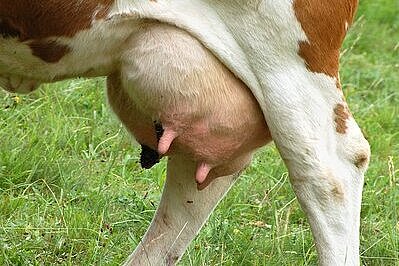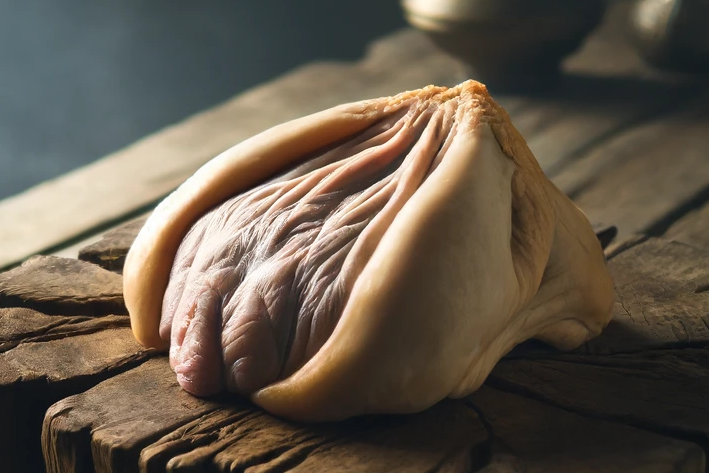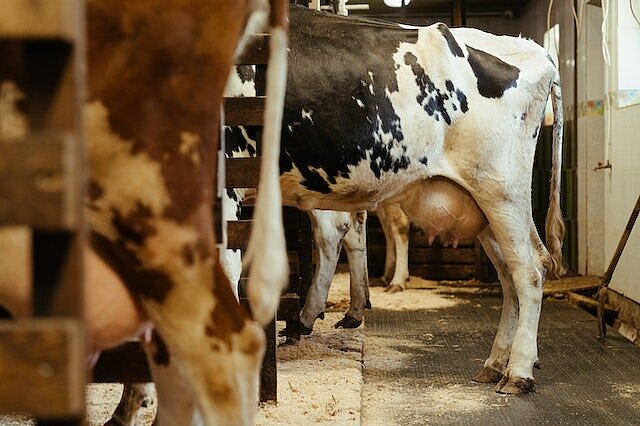Sheep udder

What is sheep udder?
Sheep udder is part of the female reproductive system of sheep and belongs to the offal or viscera category. It is traditionally used in the human diet in various cultures around the world, but its use as dog food is a relatively new trend. Sheep udder is rich in protein and contains a variety of vitamins and minerals that can make it a nutrient-rich addition to a dog's diet.
Benefits and disadvantages of sheep udder for dogs
There are several potential benefits to including sheep udder in a dog's diet, as well as some disadvantages that need to be carefully weighed.
Benefits:
- High in protein: As a protein source, sheep udder can help support muscle building and overall health in dogs.
- Rich in nutrients: Sheep udder contains essential nutrients such as iron, zinc and various B vitamins, which can help support blood health and the immune system.
- Easily digestible: Offal, including sheep udder, is generally easy to digest and can be a good source of nutrients for dogs, especially those with sensitive digestive systems.
Disadvantages and risks:
- Potential contaminants: as with all offal, sheep udder can contain contaminants in a more concentrated form, especially if it comes from conventionally farmed animals.
- Overfeeding: Excessive feeding of sheep udder can lead to an imbalance in the diet, especially if it is at the expense of other important nutritional components.
- Allergy risk: Although rare, there is always the potential for allergic reactions, especially in dogs that are sensitive to certain protein sources.
Guidelines for feeding sheep udder to dogs
For dog owners considering introducing sheep udders into their pet's diet, there are some important guidelines to consider:
- Quality assurance: choose organically raised sheep udders to minimize the risk of contaminants.
- Moderate feeding: Incorporate sheep udder as part of a balanced diet without overdoing it. It should only make up a small part of the daily food intake.
- Thorough preparation: Cook sheep udder thoroughly to eliminate potential pathogens and avoid adding spices or ingredients that could be harmful to dogs.
A nutritious but prudent treat
Sheep udder can be a nutritious addition to your dog's diet, provided it is used responsibly and in moderation. Given its high nutrient density and good digestibility, it can be particularly beneficial for dogs with specific nutritional needs. However, as with any change in diet, it is crucial to pay attention to the quality of the product and introduce it gradually to ensure your dog's wellbeing. Ultimately, the decision to feed sheep udder should be based on a careful consideration of its benefits versus potential risks.
If you notice any signs of hypersensitivity or poisoning in your dog, you should see your vet immediately. We are not a substitute for a vet, but we try to be as accurate as possible. Every dog reacts differently and we recommend you get a second opinion or consult your vet if in doubt.
Stay healthy and take good care of your four-legged friend!😊
Similar to Sheep udder
One of the biggest advantages of udder as dog food is that it is very cheap. As it is a slaughterhouse offal, it is often offered at a low price. Udder is also very tasty for dogs, who like to chew...
Camel udder is, as the name suggests, the udder tissue of camels. As with other mammals, the udder is used to produce milk for the rearing of offspring. Camel udder is used as a food source for...
Bovine udder is the cow's fourth stomach, which is responsible for the digestion of plant-based food. It contains many beneficial bacteria and enzymes that enable the fermentation of food. Beef...
Goat udder, a by-product of goat milk production, is the udder of a goat from which milk is obtained. After a goat is no longer producing milk, its udder can be used as a source of meat. Although...



